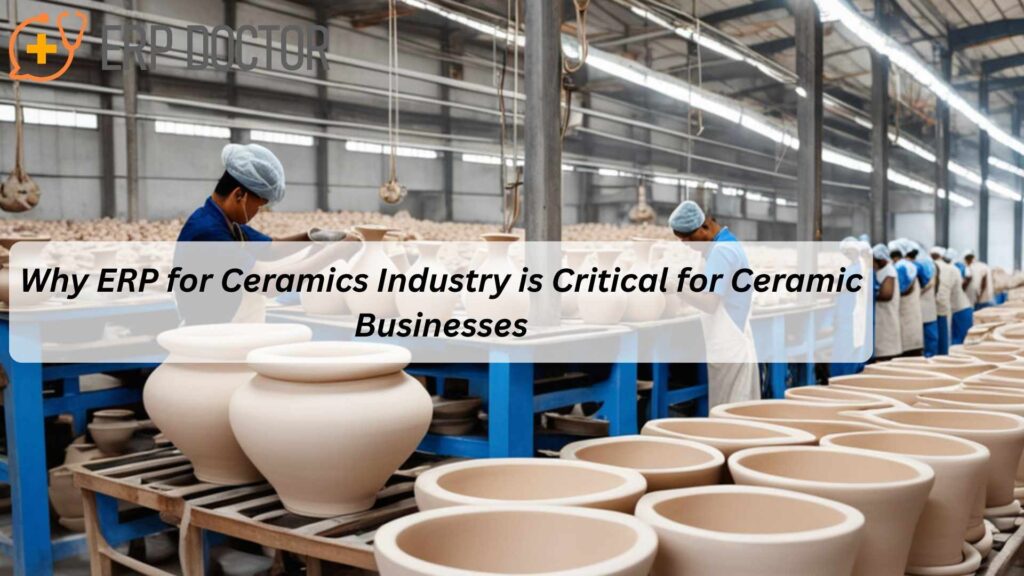
Why ERP for Ceramics Industry is Critical for Businesses

Streamlining Ceramic Production with ERP Solutions
In today’s highly competitive manufacturing environment, ceramic businesses are under constant pressure to improve production efficiency, reduce costs, and deliver high-quality products on time. That’s where ERP for Ceramics Industry plays a vital role. A well-implemented Ceramics industry ERP system helps streamline operations, optimize resources, and provide real-time visibility into every aspect of the business.
At ERP Doctor, we understand the unique challenges ceramic manufacturers face — from handling complex production processes to maintaining consistent product quality. Our customized ERP solutions are designed to help good people in the ceramics business simplify operations, eliminate manual errors, and achieve sustainable growth through technology-driven efficiency.
Why Business Management Systems Are Critical for Ceramics Industry
In today’s competitive manufacturing environment, ceramic businesses face pressure to improve efficiency, reduce costs, and deliver high-quality products on time. That’s where ERP solutions for ceramic businesses come into play. A well-implemented ceramics industry ERP streamlines operations, optimizes resources, and provides real-time visibility across the business.
At ERP Doctor, we help good people in the ceramics industry implement tailored ERP solutions that simplify operations, reduce manual errors, and drive sustainable growth.
How Solutions Streamline Ceramic Production Processes
ERP for ceramics manufacturing is not just software — it’s a complete business management tool integrating production, inventory, sales, finance, and customer service. For manufacturers producing tiles, sanitaryware, tableware, or decorative items, managing workflows manually often leads to delays, wastage, and miscommunication.
By adopting ceramics production software, businesses gain better control over material usage, production schedules, and order tracking. Every stage — from raw material procurement to finished goods delivery — runs efficiently and smoothly.
Key Benefits of ERP for Ceramics Sector
1. Improved Production Planning with ERP
ERP implementation for ceramics industry helps streamline production planning by analyzing demand forecasts, material availability, and machine capacity. This ensures better control, timely deliveries, and minimal operational bottlenecks.
2. Accurate Inventory Management
Ceramics industry ERP tracks raw materials like clay, glaze, and pigments in real time. It prevents stock shortages and overstocking while optimizing warehouse management.
3. Consistent Product Quality
Quality is the backbone of ceramic manufacturing. Ceramics production software monitors production parameters and tracks defects, helping manufacturers maintain consistent product standards.
4. Optimized Resource Utilization
ERP systems allow manufacturers to maximize machine, labor, and material efficiency, reducing downtime and lowering operational costs.
5. Integrated Financial Management
ERP solutions unify accounting, cost tracking, and profitability analysis, simplifying financial reporting for ceramic businesses.
6. Real-Time Analytics and Reporting
Advanced ERP systems provide live dashboards and analytics, enabling data-driven decisions, accurate forecasting, and strategic planning.
7. Compliance and Regulatory Support
Ceramics industry ERP ensures adherence to safety, environmental, and sourcing regulations, providing documentation and tracking for audit readiness.
Why ERP Implementation for Ceramics Industry is Smart
Implementing ERP for ceramics manufacturing transforms operations by giving teams access to accurate, real-time information. This improves collaboration, productivity, and overall workflow efficiency.
A flexible ERP system grows with your business. Whether expanding into new markets or diversifying product lines, ERP adapts without disrupting operations.
Proper implementation helps businesses move away from manual spreadsheets and disconnected systems, enabling faster response to customer demands and maintaining a competitive edge.
Driving the Future of Ceramic Business
Digital transformation is no longer optional. Investing in ERP for ceramics industry boosts efficiency, maintains consistent quality, and drives sustainable growth.
Partnering with ERP Doctor gives ceramic businesses access to industry-focused expertise and proven ERP solutions that empower them to operate smarter, faster, and more profitably.
FAQs About ERP for Ceramics Industry
1. Why is ERP critical for ceramic businesses?
ERP for ceramics industry streamlines production, inventory, and sales processes, boosting efficiency and profitability.
2. How does ERP help manage ceramics manufacturing?
Ceramics production software provides real-time insights into material usage, production schedules, and workflow management.
3. Can ERP solutions reduce operational costs?
Yes. ERP automates routine tasks, reduces errors, and optimizes resource utilization to lower overall costs.
4. Is ERP suitable for small ceramic manufacturers?
Absolutely. ERP systems are scalable and customizable, making them ideal for small and medium-sized ceramic businesses.
5. How does ERP improve product quality?
ERP monitors production stages, enforces quality checks, and ensures consistent standards for every batch.
6. Can ERP help track inventory in real time?
Yes. ERP provides live tracking of raw materials and finished goods, preventing stockouts and overstocking.
7. How long does ERP implementation for ceramics industry usually take?
Implementation can take a few weeks to several months depending on company size and process complexity.
8. Can ERP solutions support multiple ceramic product lines?
Yes. ERP manages complex product variations efficiently, allowing better planning and inventory control.
9. How does ERP support decision-making in ceramic businesses?
With real-time reports and dashboards, ERP empowers managers to make data-driven strategic decisions.
10. Can ERP improve supply chain and delivery efficiency?
Absolutely. ERP aligns production, inventory, and sales processes to ensure timely deliveries and smoother supply chain operations.



